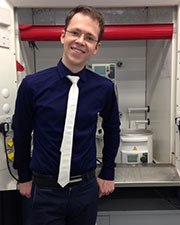Research impresses internal examiner in the final stage
Successful PhD student, now Dr Filip Kunc impressed internal examiner during his viva. The external examiner e-mailed our post-graduate administrator with the following praise:
“I have gone through Filip Kunc’s corrections and a hard copy of the approval form is in the post. Everything was completed to the highest standard. This was a fantastic example of a well-constructed thesis and should be considered for a PG thesis award if MSoP offers one.“
With such wonderful comments, we contacted Filip who is now working in Canada. Here he reports on his research and what he is up to now:
“My research project at Medway School of Pharmacy was focused on the synthesis, and characterisation of novel silica nanoparticle formulations. Colloidal silica can be used as a bio-compatible matrix to encapsulate therapeutic or fluorescent molecules. This can help to optimise drug delivery, reducing the side effects of many medicines.
Alternatively, the performance of many diagnostic assays can be improved if nanoparticles are used as fluorescent ‘beacons’. One of the biggest challenges of my work was to decorate such nanoparticles with biomolecules, so that these nanomaterials could actively recognise relevant biological targets, such as cancer cells. Appropriate attachment of proteins required deep study of nanoparticle surface chemistry. In one strategy, I built branched saccharide-based molecules to act as a ‘linker’ securely connecting antibodies to fluorescent NPs. Remarkably, these ‘nano-conjugates’ were able to detect 10 -times lower levels of antigen than a standard diagnostic assay format. Alternatively, I was researching a way how to literally ‘mold’ nanoparticle surface by a technique called molecular imprinting. As such, the biomolecules could perfectly adsorb onto nanoparticles, avoid denaturation, and maintain their natural function.
In the continuation of my research career, I decided to look at the surface science of silica nanoparticles even closer. At the present time I work for the National Research Council Canada, where I try to develop a precise and accurate way to quantify the surface chemical groups on nanoparticles. The size and the surface chemistry of nanoparticles determine their impact on human health, and environment. The portfolio, where I work, ‘Measurement Science and Standards’ is Canada’s national metrology institute; therefore it is our main concern to establish appropriate metrology for emerging technologies, such as nanomaterials. Once these are well-understood, their effective regulation in the future businesses can be set, for the best benefit of Canada’s economy, as well as for the safety of public, and environment.“
In a focus group with final year students yesterday, Filip’s name was mentioned. He helped students voluntarily with their Sustained Research Project, helping them to gain successful results.
We wish Filip the best in his new endeavour.

